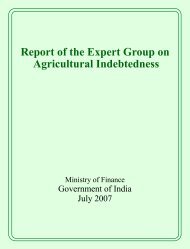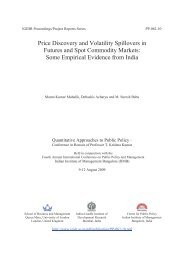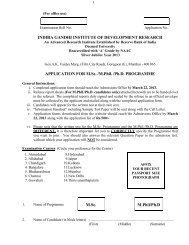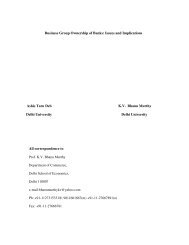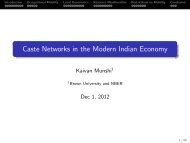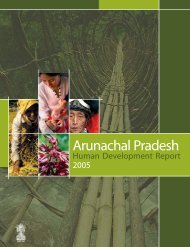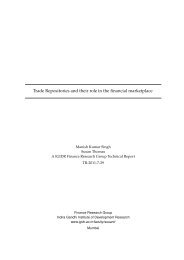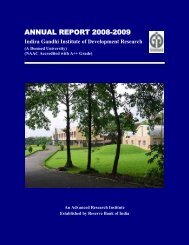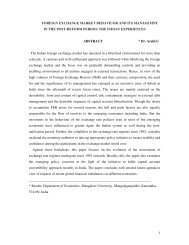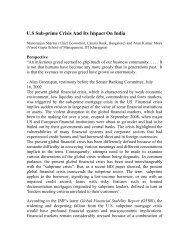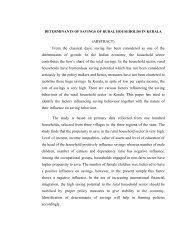Kerala 2005 - of Planning Commission
Kerala 2005 - of Planning Commission
Kerala 2005 - of Planning Commission
You also want an ePaper? Increase the reach of your titles
YUMPU automatically turns print PDFs into web optimized ePapers that Google loves.
152<br />
innovative projects, at least under the WCP. The Tenth<br />
Plan guidelines allow for each panchayat to take up<br />
detailed studies on women’s status under the WCP<br />
which is a welcome step; however this task has not<br />
been taken up in many GPs.<br />
In sum, more attention needs to be paid to gender<br />
relations as mediators <strong>of</strong> development processes.<br />
Needless to state this is a very difficult area for programme<br />
intervention as it implies penetrating the household to<br />
tackle gender power relations. However, more practical<br />
and immediate policy responses lie in investing in<br />
advancing members’ perceptions <strong>of</strong> social issues; the<br />
greater capacity building and training <strong>of</strong> resource<br />
persons from a gender perspective, within a gender<br />
analysis framework, including the ways in which social<br />
structures/institutions subordinate women; protecting<br />
women’s rights <strong>of</strong> ownership over property and assets;<br />
improving their productivity and access to markets and<br />
enhancing their managerial skills and control.<br />
3.3.2 The Prospects<br />
Democratic decentralisation being a mature stage <strong>of</strong><br />
participatory development, which in its comprehensive<br />
sense is the dynamic chain <strong>of</strong> progressive realisation<br />
<strong>of</strong> human rights, it goes without saying that the <strong>Kerala</strong><br />
variant marked a first step towards it. It should be stressed<br />
that for the first time, village panchayats were granted<br />
greater freedom in matters relating to the design and<br />
implementation <strong>of</strong> construction works. So too in the case<br />
<strong>of</strong> minor irrigation and small drinking water projects.<br />
The panchayats are now responsible for managing a<br />
number <strong>of</strong> local level institutions such as schools and<br />
primary health centres, agricultural and animal husbandry<br />
extension centres, etc. Housing for the poor and drinking<br />
water projects are also being implemented in a manner<br />
that reflect the local conditions and requirements.<br />
However, as pointed out frequently, control over the<br />
devolved institutions is still incomplete, especially in<br />
matters relating to staff. While allotment <strong>of</strong> staff to the<br />
transferred institutions has occurred to a considerable<br />
extent, postings and appointments continue to be with the<br />
parent department.<br />
As mentioned earlier, assessments <strong>of</strong> efficacy <strong>of</strong><br />
decentralised governance in general and <strong>of</strong> muting<br />
horizontal inequalities in particular, are mixed though<br />
it is definitely recognised that local governments have<br />
gained significant stature in terms <strong>of</strong> autonomy and<br />
authority to plan, finance and implement a wide range<br />
<strong>of</strong> well-being enhancing programmes and policies in a<br />
more inclusive framework. Local governments now have<br />
funds, functions and functionaries that they did not have<br />
before. However, equally important is the need to guard<br />
against its limitations, (see Box 9.6) and strengthen its<br />
functioning through greater responsiveness and need for<br />
accountability.<br />
4. Institutionalisation <strong>of</strong> Decentralisation:<br />
From Campaign to Project<br />
A major achievement, it must be recognised, is that the<br />
agenda <strong>of</strong> decentralisation has been mainstreamed in<br />
<strong>Kerala</strong>’s development discourse. The present government<br />
that lost power after enacting the <strong>Kerala</strong> Panchayat and<br />
Municipalities Acts and came back to power in 2001<br />
has also declared its commitment to the decentralisation<br />
process. However, it has replaced the ‘campaign’ mode<br />
with a ‘project’ mode, re-christening the ‘People’s Plan<br />
Campaign’ as ‘<strong>Kerala</strong> Development Programme’, aiming<br />
to take decentralisation from the campaign mode to a<br />
phase <strong>of</strong> institutionalisation to make it sustainable. The<br />
emphasis now is on redeployment <strong>of</strong> the State government<br />
staff to the local bodies, training <strong>of</strong> both the <strong>of</strong>ficials<br />
and the elected representatives and introduction <strong>of</strong><br />
accountability in financial transactions. At the same time,<br />
the new approach has not led to the kind <strong>of</strong> mobilisation<br />
<strong>of</strong> people at the grassroots level that was so characteristic<br />
<strong>of</strong> the ‘campaign’ mode.<br />
The local governments are now expected to switch over<br />
from incremental annual planning to five-year planning<br />
during the Tenth Five Year Plan period (2002-07).<br />
During this new phase, they are to graduate from the<br />
phase <strong>of</strong> creation <strong>of</strong> infrastructure to that <strong>of</strong> promotion<br />
<strong>of</strong> local economic development. Rs. 8,000 crore was<br />
earmarked for local governments for the Tenth Plan<br />
with an Annual Plan outlay <strong>of</strong> Rs.1,250 crore, exactly<br />
one-third <strong>of</strong> the Plan size for preparing their own plans<br />
from below. Some major initiatives have already been<br />
launched for achieving the aim <strong>of</strong> institutionalisation <strong>of</strong><br />
decentralisation in terms <strong>of</strong> i) a local self-government<br />
action plan, ii) a modernising government programme<br />
(MGP), iii) a decentralisation support programme and iv)<br />
a project for capacity development for decentralisation.<br />
The most important <strong>of</strong> these is, <strong>of</strong> course, the programme<br />
for modernising governance. It should be noted that<br />
33 out <strong>of</strong> the 100 initiatives <strong>of</strong> the MGP relate to local<br />
governments with a package <strong>of</strong> initiatives, meant to<br />
strengthen the local governments so as to sustain the gains<br />
<strong>of</strong> decentralisation.



